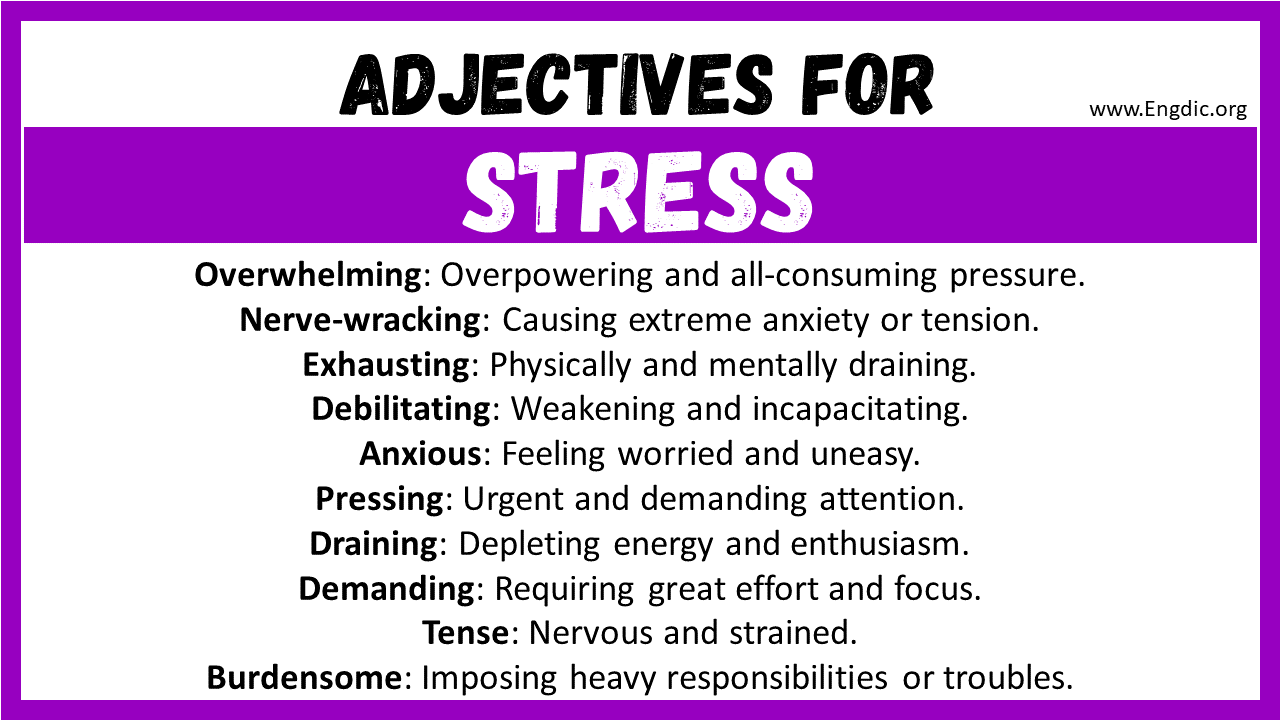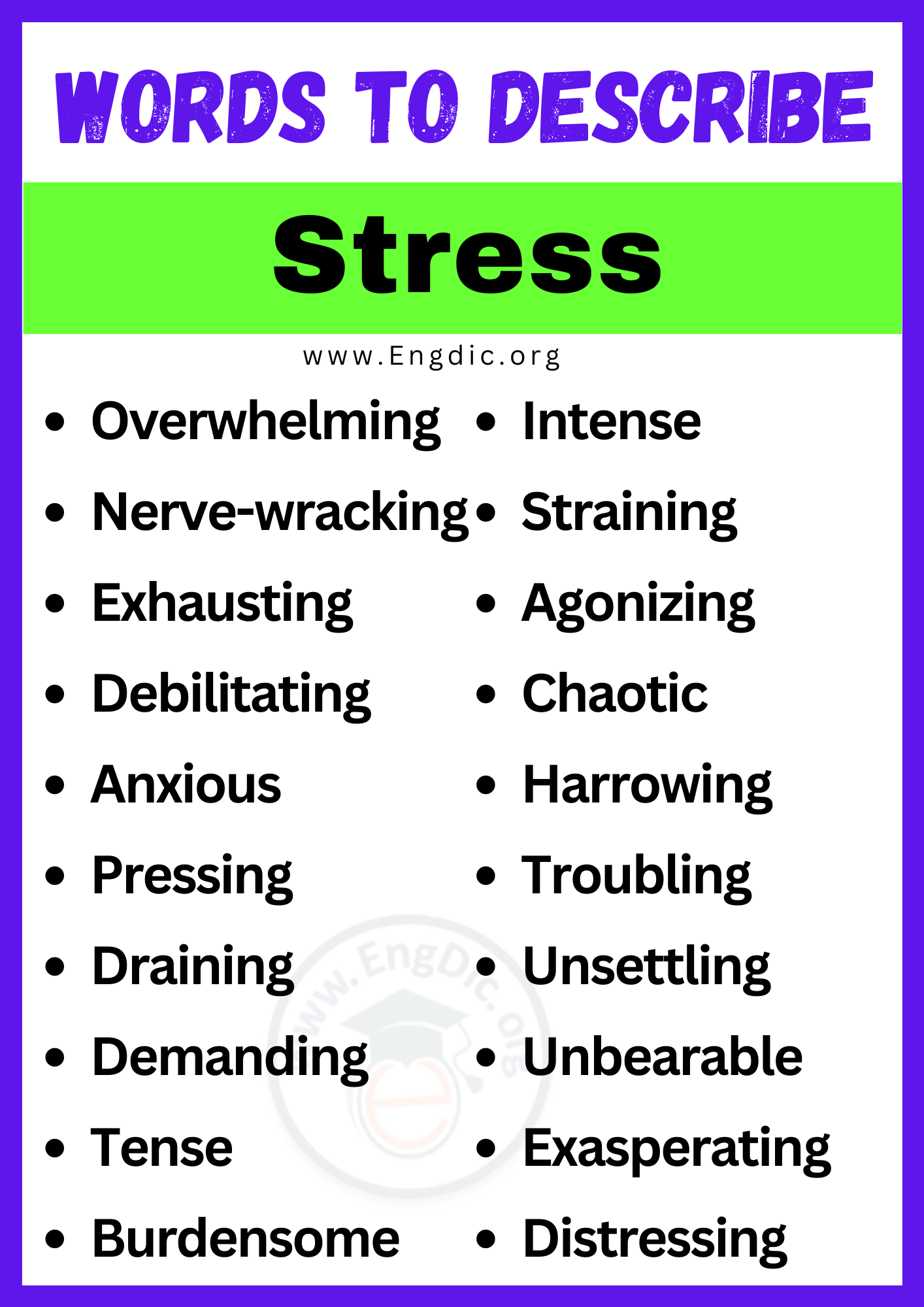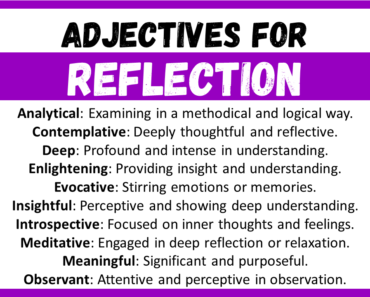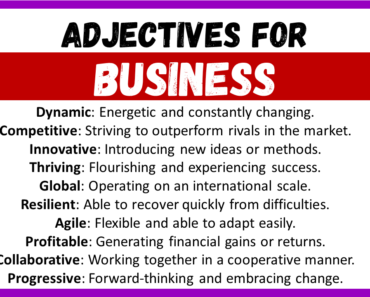Understanding stress and its effects is crucial in today’s fast-paced world. Stress can be defined as the body’s natural response to demanding situations, leaving us feeling overwhelmed and anxious. While stress itself might be unavoidable, it’s essential to recognize the various words that aptly describe this emotional state.
From “anxiety” and “tension” to “pressure” and “nervousness,” these words offer insight into the diverse range of feelings one may experience when grappling with stress. Let’s delve into these words and gain a deeper understanding of the complex phenomenon that is stress.
Adjectives for Stress
Here are the 20 Most Popular adjectives for stress:
- Overwhelming
- Nerve-wracking
- Exhausting
- Debilitating
- Anxious
- Pressing
- Draining
- Demanding
- Tense
- Burdensome
- Intense
- Straining
- Agonizing
- Chaotic
- Harrowing
- Troubling
- Unsettling
- Unbearable
- Exasperating
- Distressing
Adjectives for Stress Buster:
- Relaxing
- Soothing
- Calming
- Rejuvenating
- Refreshing
- Tranquil
- Therapeutic
- Revitalizing
- Meditative
- Uplifting
Adjectives for Stress Management:
- Effective
- Proactive
- Efficient
- Strategic
- Adaptive
- Holistic
- Balanced
- Empowering
- Resilient
- Mindful
Adjectives for Stress Ball:
- Squeezable
- Soft
- Elastic
- Firm
- Portable
- Comforting
- Therapeutic
- Textured
- Handheld
- Stress-relieving
Words to Describe Stress with Meanings
- Overwhelming: Overpowering and all-consuming pressure.
- Nerve-wracking: Causing extreme anxiety or tension.
- Exhausting: Physically and mentally draining.
- Debilitating: Weakening and incapacitating.
- Anxious: Feeling worried and uneasy.
- Pressing: Urgent and demanding attention.
- Draining: Depleting energy and enthusiasm.
- Demanding: Requiring great effort and focus.
- Tense: Nervous and strained.
- Burdensome: Imposing heavy responsibilities or troubles.
- Intense: Extremely strong and concentrated.
- Straining: Causing stress or tension.
- Agonizing: Experiencing extreme suffering or distress.
- Chaotic: Disorderly and unpredictable.
- Harrowing: Disturbing and distressing.
- Troubling: Causing worry and concern.
- Unsettling: Disturbing and unsettling emotions.
- Unbearable: Intolerable and hard to endure.
- Exasperating: Highly frustrating and irritating.
- Distressing: Causing sorrow and anxiety.
Example Sentences for Stress Adjectives
- The workload was overwhelming, leading to burnout.
- Waiting for test results is nerve-wracking.
- The marathon was exhausting but rewarding.
- The disease left him debilitatingly weak.
- She felt anxious before the performance.
- The deadline was pressing, and he worked late.
- The constant demands were draining him.
- The project was demanding, requiring overtime.
- His muscles were tense after the workout.
- The financial burden was burdensome, causing stress.
- The storm brought intense winds and rain.
- Straining relationships led to conflicts.
- The agonizing wait for the news continued.
- The event turned into a chaotic mess.
- The movie depicted harrowing survival scenes.
- The news of the accident was troubling.
- The eerie silence was unsettling.
- The pain was unbearable, causing tears.
- Her constant complaints were exasperating.
- The loss of a loved one was distressing.
Explore More Words:
Words to Describe Sustainability
FAQ’s
How to describe stress writing?
Stress can be described in writing by using adjectives like overwhelming, exhausting, and anxious to portray its intense and draining nature.
What is stress and an example?
Stress is the body’s response to demanding situations. For example, facing a tight deadline at work can lead to increased stress levels.
What are the causes of stress?
Stress can be caused by various factors such as work pressure, financial challenges, relationship issues, or major life changes.
What are the symptoms of stress?
Common symptoms of stress include headaches, fatigue, irritability, difficulty sleeping, and changes in appetite or weight.








